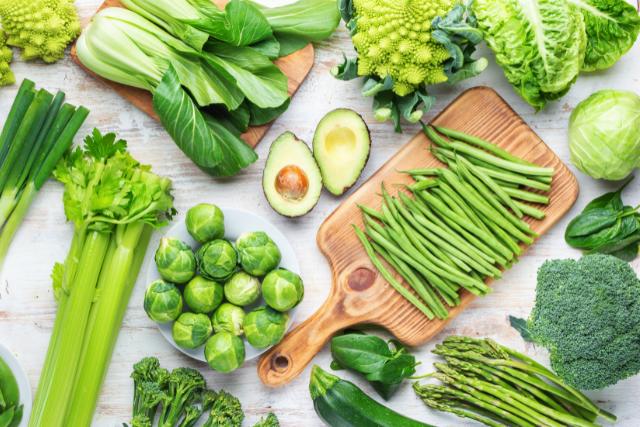Recent Posts
-

- Diabetes-Friendly Nutrition: Smart... 08.12.2024
-

- Nutrition for Chronic... 08.12.2024
-

- Anti-Inflammatory Diet: Food... 08.12.2024
-

- Low-Sodium and Heart-Healthy:... 08.12.2024
-

- Plant-Based Diets for... 08.12.2024
Top 10 Nutritional Vegetables and Their Health Advantages

Do veggies get any healthier than this? Indeed, the answer is yes! We even offer the finest of the best in the veggie area. Let's get further into this article.
One of the essential dietary categories is vegetables. It includes beneficial vitamins, minerals, and fiber, but some stand out for their remarkable advantages. Depending on their diets, general health, and nutritional demands, veggies may provide more significant health benefits to individuals.
Spinach
This leafy green is one of the most nutrient-dense veggies. This is because 1 cup of raw spinach has 16% of the Daily Value (DV) for vitamin A and 120% of the DV for vitamin K – all for just seven calories.
Spinach is also high in antioxidants, which may lower your risk of illness. According to one research, dark leafy greens like spinach are abundant in beta carotene and lutein, two antioxidants linked to lower cancer risk.
Carrots
Carrots are high in vitamin A, providing 119% of the daily value in only one cup. They also contain beta carotene, an antioxidant that gives them their brilliant orange color and may aid in cancer prevention. Your body converts this chemical into vitamin A.
These popular root vegetables contain essential minerals, including potassium and vitamins C and K.
Broccoli
Broccoli is high in glucosinolate, a sulfur-containing plant component, and its derivative, sulforaphane. Researchers have extensively investigated sulforaphane's ability to protect against cancer and may help prevent other types of chronic disease in animal and test-tube studies.
One cup of raw broccoli has 77% of the daily value for vitamin K and 90% of the daily value for vitamin C and is an excellent source of folate, manganese, and potassium.
Garlic
Garlic has been used for millennia as a medicinal herb, and its primary active ingredient, allicin, has been demonstrated to help with blood sugar and heart health. Garlic powder supplementation also improves insulin resistance, possibly leading to type 2 diabetes.
Brussels sprouts
Brussels sprouts, like broccoli, are cruciferous vegetables containing the same beneficial plant chemicals. It also has kaempferol, an antioxidant that may be especially beneficial in reducing cell damage.
This vegetable is also high in fiber, a nutrient that promotes bowel regularity, heart health, and blood sugar management. Moreover, Brussels sprouts are high in nutrients. Each serving contains folate, magnesium, potassium, and vitamins A, C, and K.
Kale
Like other leafy greens, Kale is well-known for its high nutritional richness and antioxidant content. One cup of raw kale has a lot of potassium, calcium, copper, and vitamins A, B, C, and K.
Green peas
Peas are starchy vegetables, which means they contain more carbohydrates and calories than non-starchy vegetables and, when consumed in high quantities, may influence blood sugar levels. Green peas, on the other hand, are very healthy. One cup has 9 grams of fiber, 9 grams of protein, vitamins A, C, and K, and riboflavin, thiamine, niacin, and folate.
Peas promote digestive health by boosting the healthy bacteria in your stomach and supporting regular bowel motions due to their high fiber content.
Swiss chard
Swiss chard has few calories yet a lot of vitamins and minerals. One cup has just seven calories but approximately 1 gram of fiber, 1 gram of protein, and a high concentration of manganese, magnesium, and vitamins A, C, and K.
Swiss chard is also high in antioxidants and plant chemicals that promote health, such as betalains and flavonoids. Human trials are required, but this vegetable may help prevent type 2 diabetes damage.
Beets
Beets are a vivid, adaptable root vegetable high in fiber, folate, and manganese but low in calories. They're also high in nitrates, which your body turns into nitric oxide, a chemical that aids blood vessel dilation.
Asparagus
Asparagus is rich in vitamins and minerals, making it a great complement to any diet. Only 1/2 cup of cooked asparagus has 33% of the daily value for folate and selenium, vitamin K, thiamine, and riboflavin.
Obtaining adequate folate from foods like asparagus may protect against illness and avoid neural tube development anomalies during pregnancy.
Disclaimer: The information provided in this article is for general information purposes only. All information in this article is sourced from other websites, and we do not represent any rights regarding the contents and information on the site. All rights belong to their original owner.
Sources:
- 10 Healthiest Vegetables, According To Experts | mindbodygreen
- 14 of the Healthiest Vegetables Around (healthline.com)





